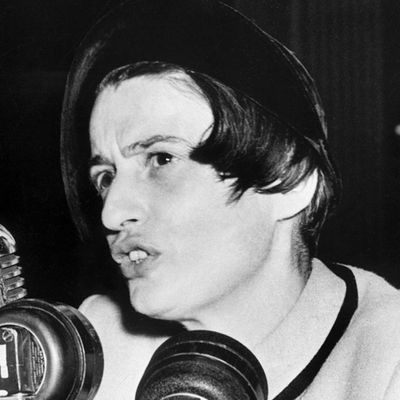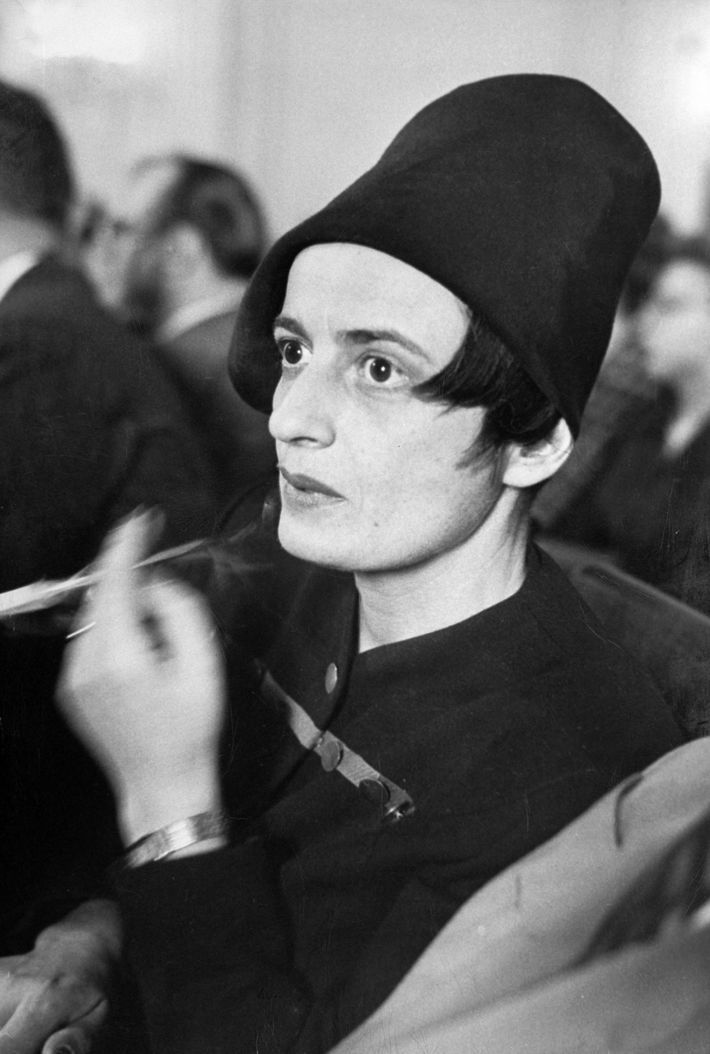
Last year, teen retailer Forever 21 briefly sold a garment called the Unstoppable Muscle Tee, featuring a quotation credited to Ayn Rand: “The question isn’t who is going to let me; it’s who is going to stop me.” This year, teen retailer Brandy Melville is offering an identical design, this time on an acid-washed crop top. An online listing describes the tee as a “J. Galt USA oversized cropped tee” with “super soft fabric” and “our Ayn Rand quote graphic in white.”
“I’ve read quite a bit of Rand, but the quote isn’t familiar,” puzzled Chris Matthew Sciabarra, who wrote multiple books on Ayn Rand and co-founded The Journal of Ayn Rand Studies. “I’ll query a couple colleagues and see if they think it’s a Rand phrase.”
In an elegant stroke of free-market irony, self-proclaimed enemy of feminism Ayn Rand has become a girl-power commodity several decades after her death. Etsy offers the “unstoppable” quote on pendant necklaces and inspirational posters decorated with flowers adorned in curlicues. Yoga retailer Lululemon once distributed a “Who Is John Galt?” tote bag. Pinterest boards dedicated to affirmations are littered with Rand, including graphic treatments juxtaposing “unstoppable” with party dresses, sexy librarians, and high-heeled shoes. All this, despite open confusion from Rand scholars on the source of the quote. “It sounds kind of like something Dagny from Atlas Shrugged would say,” Mimi Gladstein, professor of English at the University of Texas at El Paso, told me by phone minutes after teaching a class on Rand. “But Atlas is like 1,200 pages. I’ll have to thumb through my copy.”
Gladstein’s and Sciabarra’s confusion was reasonable; Ayn Rand’s most web-friendly quote is actually a misquote. Back when Forever 21 was selling the Unstoppable Muscle Tee, a blog called the Quote Investigator traced the phrase’s origin to a mashed-together dialogue from The Fountainhead, showing protagonist Howard Roark defying the dean of his architecture school:
“Do you mean to tell me that you’re thinking seriously of building that way, when and if you are an architect?”
“Yes.”
“My dear fellow, who will let you?”
“That’s not the point. The point is, who will stop me?”
When and how the quote became mangled is unclear, but in the last decade it has appeared in biographies, magazines, quote anthologies, and peppy self-help books marketed to women. Once “unstoppable” appeared in Love It, Don’t Leave It: 26 Ways to Get What You Want at Work, the leap to belly tees was, perhaps, inevitable.
Initially, I was surprised to discover Rand had become a leitmotif of modern mass-market feminism. “I’m a male chauvinist,” she told an interviewer who asked her about women’s liberation. “I am profoundly anti-feminist because it’s a phony movement,” she told another. The prospect of a female president disgusted her: “She would become the most unfeminine, sexless, metaphysically inappropriate, and rationally revolting figure of all: a matriarch.” Nevertheless, the more I looked at decontextualized Dagny Taggart quotes in girl-power contexts, the more it sort of made sense: Re-shelved in the self-help section of the book store, Ayn Rand becomes the libertarian Oprah. The slogans of rational self-interest are indistinguishable from affirmations designed for women with low self-esteem: “To say ‘I love you,’ one must first be able to say the ‘I,’” reads a Pinterest-popular Fountainhead quote reminiscent of the mantra “love yourself first.” Of course, whereas Objectivism promotes selfishness in the name of a brutally ruthless worldview, female-centric media encourages self-indulgence as a palliative to cultural forces encouraging meekness. The same forces, perhaps, that once drove Rand to declare, “For a woman qua woman, the essence of femininity is hero-worship — the desire to look up to man.”
Shopping malls selling T-shirts to teenyboppers aren’t the only ones reinterpreting Rand through the lens of third-wave feminism. Fifteen years ago, Sciabarra and Gladstein co-edited Feminist Interpretations of Ayn Rand. Gladstein, who considers herself an “individualist feminist,” plans to publish a new article on the subject this winter. (Gladstein’s take on that “hero worship” quote: “I think she wished in her own relationships for a man so superior that she would have problems telling him what to do. But I don’t think she met many.”) I asked both scholars what they guessed Ayn Rand would have thought, if she’d lived to see her name on belly tees.

“One possibility is that she would be so pleased that this precept of ‘Damn the torpedoes, full speed ahead,’ whether male or female, had been picked up,” Gladstein said. “On the other hand, she was not exactly friendly toward feminists because most feminists are left wing.”
Sciabarra predicted an unfriendly response. “Let’s face it: Rand was a litigious woman, as is her estate. And she would have been very upset at anyone using her words to ‘sanction’ movements that she believed were on the wrong side of history,” he wrote in an email. “So many feminists and gay men and women were inspired by Rand’s work, even though she was the kind of lady who would have lamented both feminism and the gay and lesbian movement.”
“But she could no more stop anyone from using her words as inspiration or as the object of ridicule,” Sciabarra concluded. Or to put the dilemma another way: The question isn’t whether Ayn Rand will let you turn her into a girl-power icon. It’s whether she can stop you. And she can’t.

